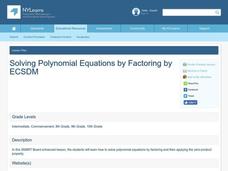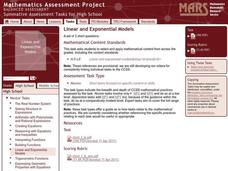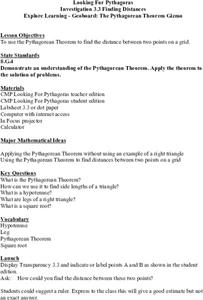Serendip
Understanding and Predicting Changes in Population Size – Exponential and Logistic Population Growth Models vs. Complex Reality
Salmonella poisoning impacts over 200,000 people in the United States each year. Scholars learn about the growth of these bacteria using multiple approaches. Then they apply the same growth calculations to endangered species and think...
University of Wisconsin
Sizing a Rain Garden
Most appropriate if you are applying the entire unit to build a rain garden at your school, this installment involves calculating the area that will drain into it. Your garden planners will need data from previous lessons, so this one...
Curated OER
Solving Polynomial Equations by Factoring
Pupils factor polynomial equations. In this algebra activity, students apply the zero product property to factor quadratic equations. They solve real life scenarios by apply the concepts of parabolas.
Curated OER
The Right Stuff
Studentsare introduced to the Pythagorean Theorem by exploring right triangles and the squares built on each side. They apply the Pythagorean Theorem to real-world problems. Students u se informal and nonformal arguments of proof (i.e.,...
Curated OER
Area Of A Circle
Students investigate the concept of area and how it can be applied to a circle. They use the right formula in order to solve different problems. The teacher leads the class through different examples and serves as a resource during...
Curated OER
Measurement: Cylinders
Math scholars observe and demonstrate how to calculate the surface area and volume of cylinders. They analyze pictures of various cylinders on a handout, solve problems on two worksheets independently, and discuss the answers to the...
Curated OER
Isosceles Triangle Theorem
In this geometry worksheet, students differentiate between regular triangles and isosceles triangles. They apply the converse theorem and the vertex angle. There are eleven questions with an answer key.
Curated OER
Probability and Applications of Simulations
Middle schoolers apply properties of probability to the real world. In this probability lesson plan, learners simulate the construction of empirical distribution. They collect and analyze data using central tendencies.
Curated OER
Binomial Expansion
In this algebra worksheet, students expand binomials and identify different terms. They expand the function using the binomial theorem. There are forty-four questions with an answer key.
Curated OER
Binomial Expansions
In this algebra worksheet, students factor and expand equations using binomial expansion. They identify coefficients of different terms. There are forty-four questions with an answer key.
Curated OER
Isosceles Triangle Theorem
In this geometry worksheet, students differentiate between isosceles and regular triangles. They calculate the area and perimeter of the triangle. There are eleven questions with an answer key.
Curated OER
Operations with Radical Expressions
Learners add, subtract, and multiply radical expressions. The worksheet includes like and unlike radicands. Use as a study guide during a lesson or for skills practice.
Curated OER
Linear and Exponential Models
Linear or exponential, see if your class can tell the difference. This very basic instructional activity looks at different representations including tables of values, graphing, and an equation to assess understanding. This would make a...
Curated OER
Trigonometric Functions
Here is a worksheet that includes three short trigonometry problems. Learners must use trigonometric definitions and identities to solve. Use this resource to review trigonometry, or as an assessment.
Curated OER
Computation with Real and Complex Numbers
For this computation with real and complex numbers worksheet, high schoolers use addition, subtraction, multiplication and division to solve 26 problems with complex numbers to win a bingo game.
Curated OER
Properties of Numbers
In this algebra worksheet, students solve problems using the 4 different properties of numbers. They apply associative, commutative, additive and distributive properties to each equation. There are 10 multiple choice questions with an...
Curated OER
Spark Notes Review of Geometry
For this geometry worksheet, students are given the side lengths of polygons and asked to calculate the perimeter, area and shaded region. There are 30 questions with an answer key.
Curated OER
Relationship between Exterior and Remote Interior Angles in a Triangle
In this triangle worksheet set, 9th graders find the relationship between the exterior and remote interior angles in triangles. They determine the formula, and apply it in 15 problems. They use a compass as needed to measure angles.
Curated OER
Pythagorean Theorem
In this Pythagorean theorem worksheet, 9th graders solve and complete 8 different types of problems. First, they go to the given website and copy the picture shown. Then, students draw a right triangle using the straight line between the...
Curated OER
Excel Lesson
Students investigate Microsoft excel. In this technology lesson, students create formulas using excel and apply these formulas to solve relative, absolute and mixed reference cells. They perform immediate and delayed calculations.
Curated OER
Family Activity: Gift Wrapping - Surface Area
In this surface area worksheet, students solve 6 short answer problems. Students determine the amount of gift wrap paper needed to cover a rectangular box using surface area formulas.
Curated OER
Impedance Matching with Transformers
In this electrical circuit worksheet, learners answer a series of 19 questions by analyzing schematics dealing with the transformers. Students will determine the amount of impedance to various scenarios.
Curated OER
Rational Numbers
For this rational numbers worksheet, 9th graders solve and complete 16 different problems that include adding and subtracting various rational numbers. First, they determine the sum or difference for each equation. Then, students...
Curated OER
The Binomial Theorem
For this Binomial Theorem worksheet, students solve 10 different problems that include applying the Binomial Theorem in each.

























